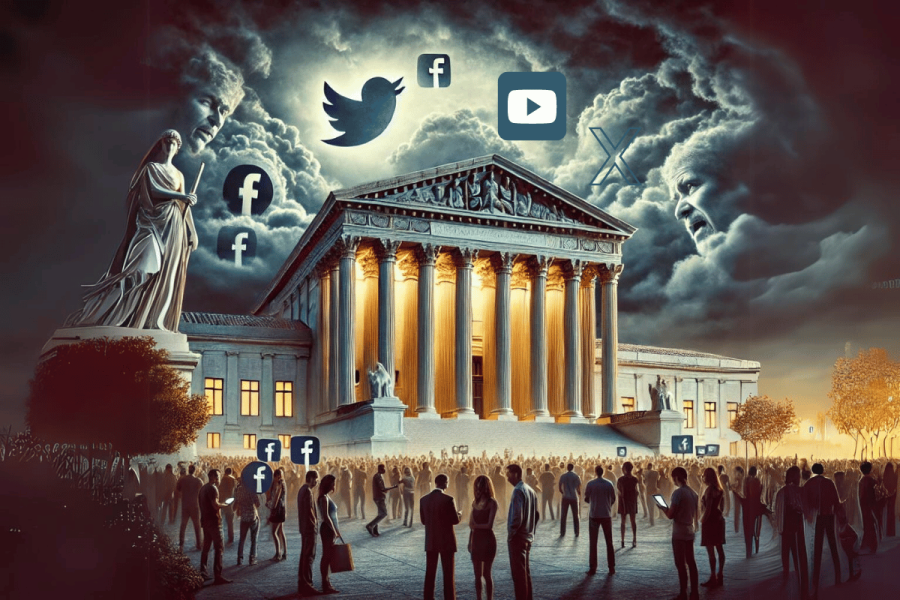
The U.S. Supreme Courtroom has referred two state legal guidelines designed to control social media platforms again to decrease courts on Monday (July 1), stating that the First Modification shields these firms from authorities meddling of their content material feeds. Nonetheless, the courtroom didn’t rule out the potential for some components of those legal guidelines to be upheld.
The lawsuit—Moody v. NetChoice and NetChoice v. Paxton—originates from laws in Texas and Florida supposed to pressure social media platforms to host a variety of person opinions. These legal guidelines had been enacted after a number of platforms banned former President Donald Trump for breaching their guidelines towards selling violence, following the occasions of January 6, 2021.
Justice Elena Kagan wrote in her summation that “work should be completed in line with the First
Modification, which doesn’t go on depart when social media are concerned.”
All of the justices agreed with the choice, although there have been a number of concurring opinions. Justice Kagan authored the bulk opinion, which was joined by Chief Justice John Roberts and Justices Sonia Sotomayor, Brett Kavanaugh, and Amy Coney Barrett. Justice Ketanji Brown Jackson concurred with components of the bulk opinion. Justices Clarence Thomas and Samuel Alito every wrote concurring opinions, with each Thomas and Neil Gorsuch becoming a member of Alito’s opinion.
Why did social media platforms file a free speech lawsuit?
The principle focus of the arguments in these circumstances was on how the legal guidelines affected solely the curated feeds of main social media platforms, like Fb’s Information Feed, implying that the platforms had been difficult the legal guidelines as a result of they restricted their management over content material curation.
Tech advocacy organizations NetChoice and the Laptop and Communications Trade Affiliation filed lawsuits, arguing that the legal guidelines infringe on the platforms’ constitutional rights to make editorial choices concerning the content material they enable or prohibit.
Nonetheless, Justice Kagan wrote: “[The] query in such a case is whether or not a regulation’s unconstitutional functions are substantial in comparison with its constitutional ones. To make that judgment, a courtroom should decide a regulation’s full set of functions, consider that are constitutional and which aren’t, and evaluate the one to the opposite. Neither courtroom carried out that essential inquiry.”
The justices put aside earlier rulings by the eleventh and fifth Circuit appellate courts and supplied tips for decrease courts to judge the constitutionality of those legal guidelines. The laws emerged following complaints from conservative politicians in each states, who accused main tech firms of bias towards conservative views. Completely different rulings by appellate courts in every state on the legality of the statutes led to the Supreme Courtroom being tasked with the ultimate resolution on social media regulation.
“At present, we vacate each choices for causes unbiased of the First Modification deserves,” Justice Elena Kagan said within the majority opinion.
Knight Institute feedback on Supreme Courtroom ruling In #NetChoice circumstances involving Florida and Texas social media legal guidelines. See our assertion on as we speak’s resolution from @JameelJaffer under. https://t.co/sOGyBMCS7s pic.twitter.com/pHbXxaxtRt
— Knight First Modification Institute (@knightcolumbia) July 1, 2024
Kagan’s majority opinion in #Netchoice is complicated, however additionally it is refreshingly clear in regards to the coronary heart of the #FirstAmendment challenge: “a State might not intrude with non-public actors’ speech to advance its personal imaginative and prescient of ideological steadiness.” https://t.co/hk8K4eI9IY
— Dr. Mary Anne Franks (@ma_franks) July 1, 2024
The Knight First Modification Institute at Columbia College stated the ruling was “cautious and regarded”. George Washington College regulation professor Dr. Mary Anne Franks added that it was “refreshingly clear”.
Featured picture: Canva

